#miriamlandis
Text
50 Years of Island Books: Laurie Raisys
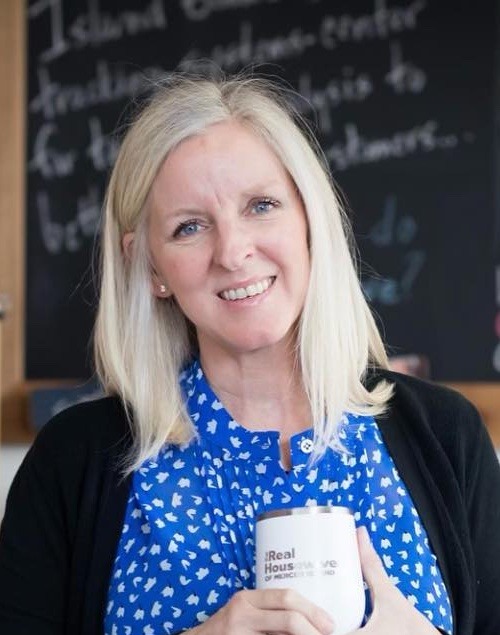
Laurie and Victor Raisys bought Island Books in July 2015 and became the fourth owners since the store opened in 1973. They are both accomplished Microsoft alumni, but don't let that fool you into thinking they've had an easy road. Underneath that busy exterior are community builders and devoted parents of four. For our final 50 Years of Island Books installment, I sat down with Laurie in the back of the store. Here’s our conversation:
Miriam: Let's start with your favorite book category.
Laurie: I’m a total fiction person. Not historical, but thrillers, current fiction and romance. I love messy, dysfunctional families — I am a Lisa Jewell person all the way.
Miriam: Ha! OK. Tell me about your proudest accomplishment.
Laurie: Making it through COVID. It was so incredibly hard and I felt the pressure as an owner with employees, responsible for their livelihood. I remember seeing all these bookstores closing, watching it happen on social media and talking with Victor about being so sad and scared about what would happen. Nobody knew what was going to happen. And then Victor wrote that [Laurie points at a sign on the wall in the back room] and stopped by the bookstore and gave it to me. It says “Believe, make it happen. We will make it.” And we did.
Miriam: That sign is from during COVID.
Laurie: That's from during COVID.
Miriam: And you drove books around to individuals all over the island. To me, that was incredible.
Laurie: Sofija [Laurie’s oldest daughter] and I did a lot of that. Victor and Erik [Laurie’s son] did some too. Everybody helped. By the end, we knew the island like the back of our hand.
Miriam: It was awesome. Tell me about what it was like when you started running the bookstore. I remember when you took over in the back.
Laurie: When I bought the bookstore eight and half years ago, I didn’t know anything about books other than how to read them. And Garry [the longtime receiver] was leaving. I said, “Hey, receiving the books is a perfect entry point for me.” And what a great thing to learn, because you see everything coming in. I’m forever grateful that I got to do that. Of course, I made mistakes, and Garry was so incredibly patient. He was the best teacher. And then, when the store became mine, I still handled receiving for a long time. Just the other day I thought, I can’t believe what I know now versus what I knew then. I never knew that books come out on the Tuesday or that we have a lot of hardcovers because libraries demand them. And I’ve learned so much from the publisher’s reps who moved from Roger to me. We’ve all taken on new responsibilities and learned a lot. It’s been an enormous education.
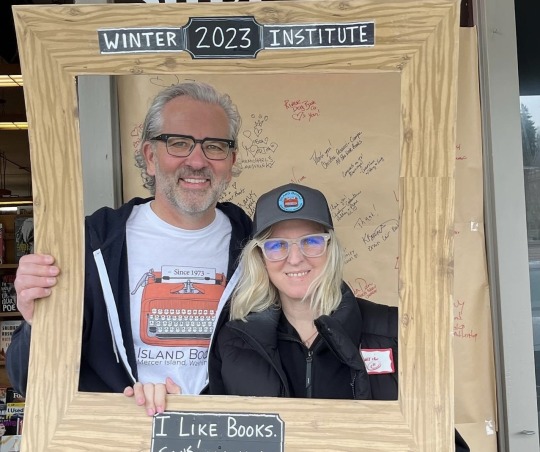
Laurie and Victor during ABA’s Winter Institute Bookstore Tour
Miriam: Tell me how you all work together.
Laurie: As a team, we are solid. I appreciate the fact that the longer a staff member has worked here, the more they know how to do a lot of things. When we don’t know, we ask others. It’s a team effort and that synergy feels like a huge accomplishment.
Miriam: It is. That’s how a small business keeps running. You support each other. How would you say your staff would describe you?
Laurie: Grumpy?
Miriam: Can I put that in, because it's funny?
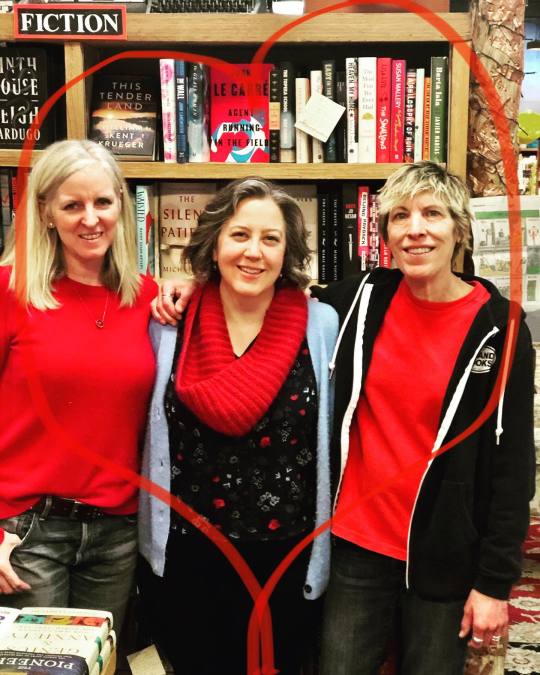
Laurie, Lori and Cindy wearing red!
Laurie: [Laughs and nods] Grumpy, kind, and generous. It can be a challenge, as a private business, to do a lot of the things we do for the team, but I do it because they all work really hard. I don’t waste a lot of time when I’m here because, for a long time, I spent sixty hours a week working in the store. When I needed to step back and ensure I had a little more home-life balance, that’s where the trust came in, giving people more responsibility. When I’m here I just get stuff done, although I love talking to the customers. And I do really appreciate my staff.
Miriam: You’re never sitting! I would say many of your efforts are invisible to the outside world. You work with other small businesses, put on author events, book clubs, school fundraisers, and story times and it only happens because you do so much outreach. Organizing and planning takes so much time. Did that surprise you?
Laurie: There are a lot of people that reach out to you. You can’t say yes to everyone. And it’s not because you don’t want to, but it’s a lot of effort to set up for an event. And when you do it and the turnout is low, it’s disheartening for everyone involved. Now we are very thoughtful about our events. In October we have a great lineup. It’s a month of really interesting and diverse books.
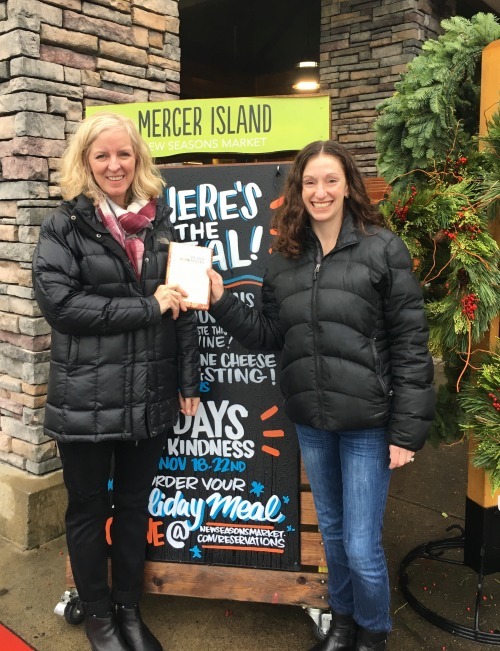
Laurie and Miriam hiding books around town
Miriam: I was going to say you do an excellent job of curating toward local interest.
Laurie: I mean, for us, when we do an event, we can only promote to the people who follow us at Island Books. So authors need to let the people who follow them know, “Hey, I'm going to be in this place. Come see me.” And then more people know where to see that author because they may not follow our store. The major Seattle indie bookstores have an easier time getting people to attend their event. But we’re in an off-the-beaten-path location, even with the draw of parking.
And not all of our community involvement happens in the store. We sponsor the farmers market. I’ve given support to the high school band for years, and I always place an ad in the high school newspaper during graduation season to say congratulations. I’m the chamber board’s current interim president.
Miriam: You've hosted weddings.
Laurie: That was so exciting. We just had our second senior take pictures here. She is a local swimmer, and I supported the high school swim team this year. It's just a great community. They have supported us for fifty years, and in my eight years, especially during COVID, they kept us alive. We would not have survived without them. It’s not just the people on this island. People who grew up here and moved away read the Slate story or heard from their parents that we were struggling. They called in and ordered not only tons of books but gift cards. People talk about their community bookstore being their third place, and I’m proud that Island Books is at the top of the list in terms of representing what a community bookstore means. It’s a very reciprocal relationship.
Miriam: Island Books is a hub on Mercer Island. You get a unique look at the community.
Laurie: My husband grew up here, and all my kids have been raised here. When you’re that involved in the schools and raising kids here, you see how the community works.

Vaiva, Sofija, Luici, Erik and Luna Raisys all grown up
Miriam: That’s so true. What does 50 Years of Island Books mean to you?
Laurie: I just think it's incredible that it's 50 years. It's 50 years in one place. And not without challenges. But to be in one physical space for 50 years is incredible. It's amazing to me. There are customers who still shop here that can say, I was here on the first day. Lola Deane, who opened the store, is still here. We’re so lucky. People are funny. They'll come in sometimes and ask, “Is this an independent bookstore? There's so few left.” Which always surprises me, because we have around 28 independent bookstores in the greater Seattle area. We are so fortunate as an entire Pacific Northwest community because there are many independent bookstores. It's ridiculous. We're rich beyond rich.
Miriam: And we have fascinating individuals who own and run them.
Laurie: The owners are the coolest people with a unique perspective. It's so vibrant and a great community, too. Hey, did you see we just had the first Asian bookstore open? [mam’s books]
Miriam: It’s so wonderful.
Laurie: I love to welcome new community into our bookstore universe. I was fortunate to inherit a store that already existed. I don't know how I would feel if it was brand new and I had to do it myself. The fact that the store was already running lowered my learning curve. Our network is how indie bookstores will survive: if we have a community and we have each other.
Miriam: Helping each other is essential. Is there anything else you'd like to say to finish up?
Laurie: We're excited to celebrate our Golden Jubilee and hope the community comes to the store! We're going to have little things happening all day on November 4th. The typewriters will be out. We'll have story time in the morning. There will be a blind wrapping contest. We’ll have cookies and cool stickers that say, “I've been booking it at Island Book since…” so people can write down how many years they've been here. We’ll give away gift cards every hour or so. And then we'll have cake and champagne at five o'clock and say thank you.
Miriam: Well, first, thank you, Laurie. Congratulations. I’ve enjoyed creating this 50 Years of Island Books blog series and feel honored to share it with you.
To our Island Books community: Lori Robinson will be back on the blog next week with an invitation to the party! Stop by the store on November 4th and join the celebration. It wouldn’t be happening without you!
—Miriam
3 notes
·
View notes
Text
50 Years of Island Books: James Crossley
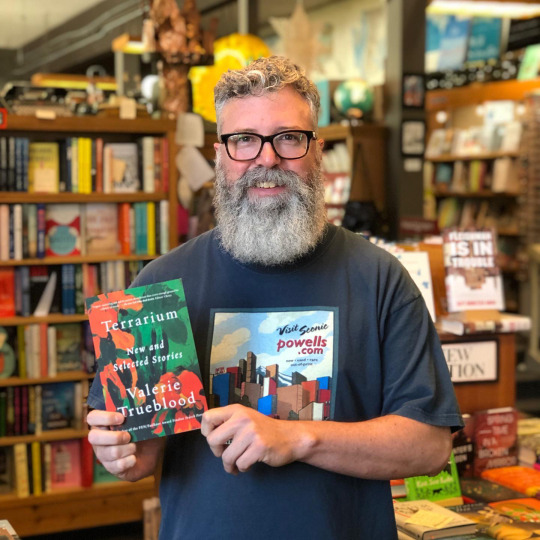
James Crossley has been a bookseller for over 20 years. His longest bookstore tenure was at Island Books, where he wrote so prolifically for their blog that Mercer Island was in danger of capsizing under the weight of his words. He was forced to flee to the mainland, and is now the manager of Madison Books in Seattle, named in 2022 by Publisher's Weekly as one of the five best bookstores in America.
Miriam: First off, my friend, I want to ask you about a way I know you left your individual imprint on the store. That was through buying, a skill which I’m sure comes in very handy today at Madison Books. Can you tell me about your philosophy behind buying and curating what goes on the shelves? In what way did the customers inform the books you chose to order and put on our display shelves?
James: I don't know if I'd call it a philosophy, although it's certainly closer to that than it is to a hard science. The only training I had before doing it involved hanging around in bookstores, but I have done A LOT of that in my life. I guess I think of selecting titles to carry as an attempt to answer a series of questions. Is this book like the others on our shelves? Is it by an author who's already popular? Is it nothing like the books on our shelves in a way that will provide surprise and delight? Is it important? Is it fun and frivolous? Can I imagine the audience for this book? Will we want a huge stack to satisfy hordes of readers? Do we want a single copy to wait quietly in a corner until one person finds it and thinks it was put there just for them? Will someone behind the counter here, maybe me, enjoy it and be excited about selling it? Add up all the yeses and the order is ready to place. Miraculously, the budget always adds up as neatly, almost like I planned it that way.
All of this is guided largely by the customers--paying attention to what they buy, and more importantly, what they love, is what makes it all possible. They teach us what to look for and then we find it for them. As I've said before, a bookstore is what happens when you put together some booksellers, some customers, and the ever-changing mixture of books that happens to be present on a given day. It's a dynamic, shared experience even more than it is a static, physical place.
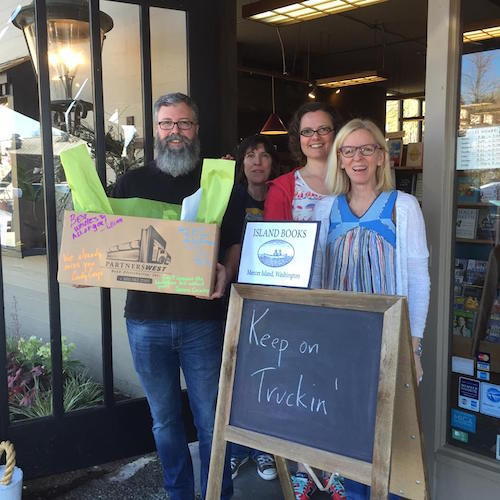
Miriam: That’s for sure. What do you think the biggest misconceptions are about working in a bookstore? How does the location of the store inform a bookseller's experience?
James: "Oh, I wish I could work in a bookstore! I'd love to spend all my time reading!" If only. After twenty years of doing this, my total in-store page count doesn't add up to a chapter. But I do love working a job that inspires envy, regardless. The other big misconception is that bookstores are stodgy, old-fashioned operations. In fact, this is a game of continual reinvention, and those of us playing it try new things all the time. Hence the success of indie bookstores during the pandemic, relative to other kinds of retail.
Despite what I said earlier about a bookstore being more of a state of being than a physical place, location dictates a great deal about the experience. Who's coming in regularly? Hip young singles or families with lots of kids? Are they locals or outsiders? Compare the ostensibly similar stores on Mercer and Bainbridge Islands and consider how many more tourists one sees than the other. Nothing wrong with itinerant customers, but it's nice to see the same friendly faces on a consistent basis. And wherever a store is, I think it should always represent its community. You should be able to walk into it and find a comprehensive selection of books about its region and the people who live there. Easy enough in the Pacific Northwest, which is rich in history and with authors to write about it: Homewaters by David B. Williams, Pushed by Ana Maria Spagna, Unsettled Ground by Cassandra Tate, Where the Language Lives about Vi Hilbert, Tributes by Mary Henry…There's a reason that Mercer Island History was a top seller almost the whole time I worked at Island Books.

Miriam: I’m with you—don’t even use the word stodgy near the word bookstores. Creativity and drive characterize all the book people and indie bookstores I know! Speaking of creativity, tell me what it was like to watch Island Books move into the digital space. As I recall, you built the basic website, right? Do you have a favorite memory or mishap from that time? What did you feel shifted when we started the blog?
James: My first tech job in the store involved resuscitating a version of the Island Books website that had been set up by Nancy Shawn during her initial tenure. She'd left before I came on board but has since returned, of course. The island gets its hooks into everybody, doesn't it? It was a nice-looking site, but it didn't do much, as the technology for more wasn't available to us then. Soon after, though, I got the chance to switch us over to a more modern platform, one that accommodated easier updates and allowed customers to order books remotely. That web incarnation of Island Books included a prominent Shakespearean tagline first used in the store's early days: "I like this place and could willingly waste my time in it." Still one of my favorite ways to describe the joint.
My best memory, however, is that we somehow convinced management that the store needed a blog. If either of us had made the argument on our own it probably would have seemed silly, but together we marshalled a good case. That gave us the excuse to say almost whatever we wanted about books and spout those opinions frequently--twice a week at first! Not only did readers respond with enthusiasm, but they also told us they didn't want to have to look online for updates. Instead, they preferred we send them those posts via email, and so our newsletter was born. That kept us in touch with Mercer Island expatriates and gave us a wider audience besides. I'd always felt that Island Books was too well-kept a secret, and I think the blog put us on the national map next to other, more famous bookstores, where we'd always belonged.
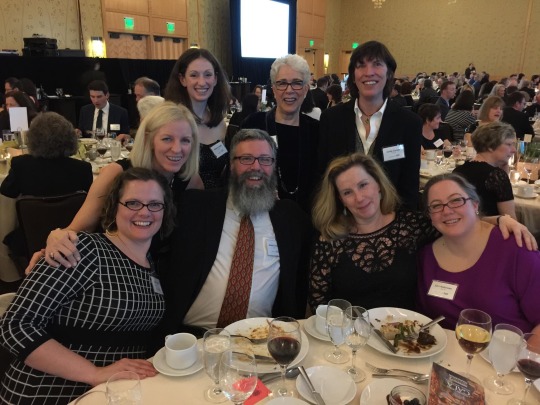
Miriam: I agree, teamwork was the key. I have great memories of sitting in that back room with you and Roger, slowly coaxing our fearless leader at that time into the future. How do you think the blog changed the way Island Books connected to the community? Do you have a favorite post that comes to mind, maybe one that inspired a conversation or connected to an in-store memory?
James: Island Books has long been deeply, deeply ingrained in the Mercer Island community, since way before people started making fun of Al Gore for inventing the internet, so it's not as if the blog was some kind of breakthrough technology. It did connect us to a more far-flung audience, as I mentioned, and it did (and does) extend the presence of the store beyond its doors. When a customer is reading a post at home, hopefully they feel a bit as if they're in an armchair in the fiction section or having a chat across the counter.
Speaking of connections, my favorite posts include the ones where we found unexpected overlaps in our taste and got to banter about books we both liked, Chocolates for Breakfast and When Breath Becomes Air, for example. And I really love the posts that grew into or out of others, such as the one I wrote entirely in long, rambling sentences after you made a comment about my proclivity for long, rambling sentences. That's the way my mind always works when I read, with one book reminding me of another, sending me leapfrogging from one known lily pad to the next until I end up somewhere new.
My favorite in-store memory post is probably the one about the vulnerable little dollar bill that hung for dear life on a clothesline and warmed all our cold, cynical hearts. I also loved all the times we got to write about our kids. And the times you wrote about ballet, and those rare occasions we convinced Cindy to write something for us. Oh, and I have to mention the tribute to legendary Northwest writer Brian Doyle we ran in the last months of his life. For months, even years afterwards, it caused people from across the country to tell me how much he'd meant to them.
Miriam: Oh yes, Brian Doyle, of course. Also don't forget the time we interviewed Nancy Pearl together in the store, or that great interview you did with Joel McHale at his event! Wonderful memories, many of which are my favorites too. It's so good to catch up, James, as ever. Thanks for making the time.
To our Island Books community: In the next 50 Years of Island Books installment, I’ll be talking to former bookseller Kay Wilson, who worked at the store for over 15 years. She's living the good life on Lummi Island now, but get your to-read list ready. Kay's still brimming with book recommendations and she's going to share a list of her favorites, just for you.
—Miriam
4 notes
·
View notes
Text
50 Years of Island Books: Roger Page, Part 1
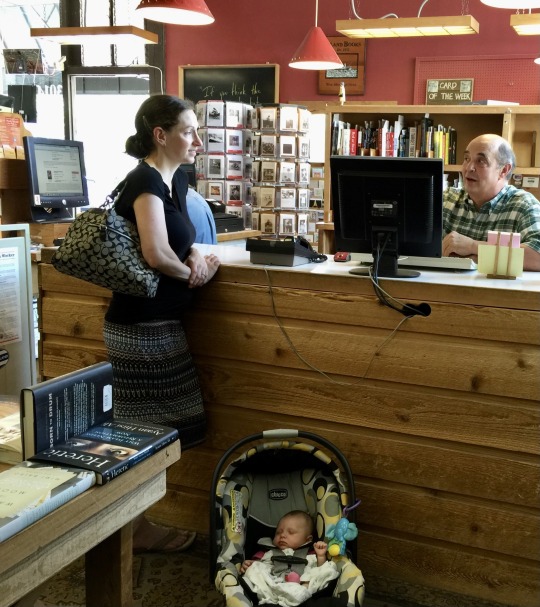
Roger Page says even though his wife Nancy’s successful wedding floral business was more profitable than Island Books in the early days, they committed to Island Books because the scheduling and lifestyle were a better fit for having a family. Nancy Page would tell you that her final and most enjoyable career was the 15 years she spent working at Island Books. These days both Pages are enjoying their retirement, still reading plenty of books and traveling to visit those not-so-small children, Emma and Lewis, who were the deciding factor in ownership of Island Books all those years ago.
Miriam: Roger, tell me what it was like during the first month you owned Island Books. Did you have a moment that made you realize what you could bring to the community?
Roger: Remembering the first month of owning Island Books is hard. It's a bit like the frog in the boiling water story. You sit in the pot for a long time enjoying the warmth, and suddenly, you realize you're the one being cooked. In 1984 I called every bookstore in Seattle looking for a "Christmas season" job, and Island Books was the only one that called back. I did realize in the first month that I was very lucky to have landed in a much-loved bookstore on an affluent island. I was the only male and only full-time employee among 19 well-educated part-time women. Everyone was recognized, everyone was appreciative, and everyone really read. The bookstore felt big, full of surprises, and full of energy.
I decided to stay on and went to something called Bookseller School the next spring. Full of "new ideas," I returned, and thanks everlasting to the generous and kind three women (Marge Wilkens, Fam Bayless, and Elinor MacDonald) that ran the store, they made space for me and entertained my ideas. I didn't deserve a seat at the table, but I think it was easier to deal with me than all their friends that worked with them. After a year, I was titled "floor manager," I focused on streamlining the systems, culling the aging inventory, and rebuilding sagging shelves. The customers were great, but not friends yet and there was much to be simplified, for the store had suffered a bit from too many cooks. I was single and willing to heft, nail, or come in early or late.
After six years, I really felt I had found my calling, and I was married to Nancy, the wedding florist, who came to work at the store later down the road in 2000. As we began to think about a family, I approached the ladies about buying in, and they again took a generous and gracious turn and said they would back me if I wanted to take the reins alone. So with a Volkswagen bus as collateral, we had a lovely afternoon drinking fine Washington wine and signing the papers at the Bayless home. What changed in the first few months of owning the store was that the community began to recognize me.
I had a role and a responsibility to maintain the standards of hospitality and good books. Honestly, supported by the ladies, I felt confident and excited and loved making real friends of all ages and stripes. I (and eventually Nancy) had fallen into the arms of a big warm family, and I loved coming to work and unlocking the door each morning.
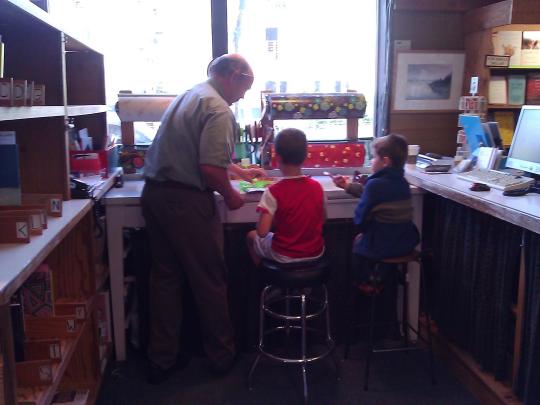
Miriam: Tell me about when the unmentionable online and big box retailers came on the scene. What were the in-store clues that wisdom and humanity could endure up against the algorithms?
Roger: My time at Island Books from the late eighties to 2015 parallels the most dramatic period of change in the history of the book retail industry. In some ways, we were the canary in the coal mine for a set of revolutions in the information industry and general retail. When I started, we were in the mom-and-pop store era of bookstores. This model led to great diversity, strong community ties, and low competition between stores. People (especially people on Mercer Island) had their store, and the store was catering to that community as much as making a profit.
Everything began to shift in the late eighties. First, it was a trickle of Walden and B. Dalton chain stores in Seattle. I wrote a now prescient memo—you can look at our old blog post about that infamous memo here—
https://mercerislandbooks.tumblr.com/post/62015474728/island-books-in-1986
about the specter of the discount chain of Waldenbooks and the need to strengthen our service and ties to the community. Then the first direct blow to business came in 1993 when Barnes and Noble opened a big box store in Bellevue. We had always prided ourselves on our children's section, and overnight there was a store twice our size 10 minutes away. Then Costco became more popular and, as a sign of things to come, they used books as a loss leader and broad-based customer attractor. Finally, Microsoft and personal computers made their mark on homes in the early 90s. The bookstore as a storehouse of knowledge for adults and kids faded fast when they could look it up "on their computer."
Honestly, my reaction to these existential changes was largely terror. I was starting a young family, the store was our sole means of support, and it seemed like a new battle to fight every year. We reacted by working hard to speed up our special-order business ("We don't have that title but can get it for you Wednesday!") and to emphasize our free shipping and the expertise of the booksellers. The community appreciated our efforts, and despite plenty of dips and valleys, we continued to grow slowly despite the competition. In the late 90s, Amazon arrived and presented a different magnitude of the challenge. For the first time between the growth of the web and Amazon's "free" home delivery, many customers never saw the need to visit our store.
If we never saw them, our knowledge and service would be useless. So, we turned our focus toward marketing and events doing all we could to draw them in. This led to huge Harry Potter parties and hundreds of tiny evening gatherings of self-published Island authors. We also began to emphasize our school fundraisers to connect and show our commitment to the community.
Throughout these roughly twenty-five years of change and increased competition, almost three-quarters of the independent bookstores in the country closed. The Mom-and-Pop store model was defunct. We learned about lean inventories, just-in-time ordering, niche marketing, shopping as entertainment, and the value of "third places" in the community. Our deep ties to the community ultimately helped us weather the storm.
One moment stands out. At some point in 2005, Amazon tried out a new idea on Mercer Island to use school communities to raise funds for the school. We had been doing this for a decade and had raised several hundreds of thousands for local schools. One day a big "Buy from Amazon " banner appeared outside a local school. We felt like jilted lovers: angry, scared, and sad. This was very close to home, and we knew if Amazon lured away families, we would not survive. I said as much to some long-standing customers, and their response exceeded all expectations. The school's foundation sided with the store, and the banner disappeared. The unspoken loyalty of the community was voiced out loud, and it was a turning point for the store.
It became clear that our fate was tied to the choices they made. From that point on, it felt that there was a deeper appreciation for the bookstore and, in turn, for our community. We were joined at the hip. Through the spring of 2009 with the Great Recession, the Kindle was the darkest hour for independent bookstores. We bounced back quickly and had some of our best years (2010-2015) at the end of our tenure as owners.
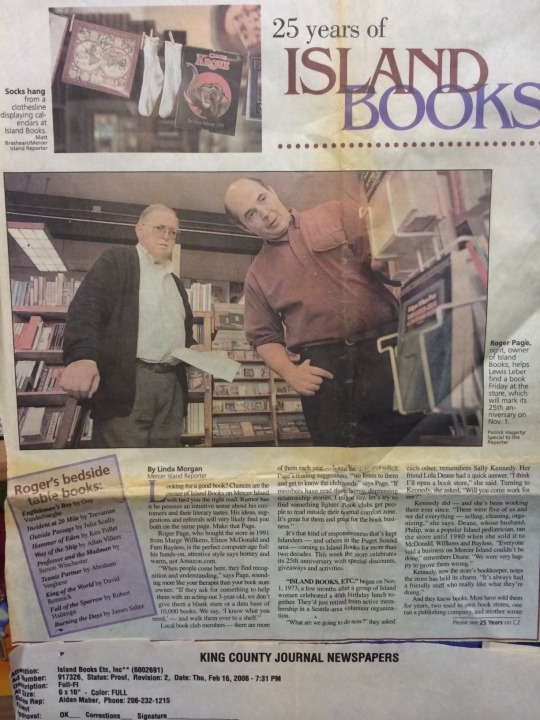
Miriam: That was right around when I came on the scene after I’d defected from the Amazon Books team and moved to the island from Capitol Hill. I remember we had lunch across the street from the store, and you gave me a lot of this oral history over Thai food. As I listened, I was thinking, how can I use all the knowledge I gained at Amazon to help Island Books thrive? And thrive it did and continues to endure. It’s like the little engine that could.
To our Island Books community: stay tuned for part 2 in this conversation, coming soon. Once Roger and I get going on the subject of Island Books, it’s hard to stop us...
—Miriam
#islandbooks#miriamlandis#rogerpage#nancypage#indiebookstore#bookstore#Miriam landis#50 years of island books
4 notes
·
View notes
Text
Miriam and Nancy Pearl in Conversation

Hello, my beloved Island Books community! Dare I say it? I'm saying it. I'M BACK.
Islanders know me for various reasons--mom of four chasing kids at the local parks and schools, Daniel's wife, ballet teacher, writer, neighbor, and friend. But for those of you that have followed this blog a looooong time, you might remember that former Island Books bookseller James Crossley (now across the bridge managing our dear friend Madison Books) and I started the Island Books' blog back in 2011. Other duties and a pandemic took me away from it for a few years, but the dust is settling, the sun is shining, and OMG, Island Books is heading toward our 50th anniversary at the end of 2023.
A 50th anniversary is no joke. There's a lot to say to honor my favorite place in town, so I'm lining up next to Laurie and crew to chime in. In the months leading up to the big day, I'll be chatting with current and past Island Books employees to trace the history and memories that make our store so special. I'll also be talking to our authors and literary friends who have a special connection with Island Books. Consider this project my yearbook to honor a local treasure, and if you read along with me, you'll see why Island Books is a pillar of our community.
I'm kicking off my series with a chat with a woman who needs no introduction. Nancy Pearl is an American librarian, best-selling author, literary critic and the former Executive Director of the Washington Center for the Book at Seattle Public Library. But who she really is, to me, is one of the greatest book lovers of our time. She's someone I admire and wish to be like, she's funny, she's smarter than hell, and she's our dear, dear friend.
Miriam: Nancy, tell me about the first time you visited Island Books. What are your memories there and what stood out to you about the store?
Nancy: The first time I visited Island Books was in 2003 when the first Book Lust book was published. Roger invited me to come talk about the book. I loved the store. I think small and cozy bookstores are the best, and Island Books was one of those stores that are wonderfully curated with a glorious mixture of the popular and the unusual books that you wouldn't see at a Barnes and Noble, for example. It reminded me of Yorktown Alley Bookstore, the bookstore I managed in Tulsa years ago.
Miriam: I didn't know you managed a bookstore! That's good to know and explains a lot about you. I went and did my google duty and saw that the Yorktown Alley Bookstore closed, which happened to a lot of indies once Amazon came on the scene. Can you tell me a little more about working there? What kinds of books did you recommend to customers back then, and how have your recommendations changed between then and now? How did that experience help launch you toward library work?
Nancy: I already had my library degree when we moved to Oklahoma and 2 daughters, ages 9 months and 31 months old; 7 years in Stillwater and then moved to Tulsa and my wonderful husband commuted back to Stillwater. He'd go in Monday mornings, sleep (in his office) Monday nights, come home Tuesday night, stay in Tulsa on Wednesday, and then back to Stillwater on Thursday and home again Friday evening. A good friend from Stillwater moved to Tulsa and opened the bookstore and when I was ready to go back to work I started working there. I think I said this already, but it was really a wonderful bookstore. I sold many many copies of all my favorite novels from 1980 to 1989, when I went to work at the public library, including Anne Tyler's Dinner at the Homesick Restaurant, Salman Rushdie's Midnight's Children (it was the then Random House rep, whose name I don't remember, who told me to read it, and he was so right), Pat Conroy (I met him at what was then called ABA conference in New Orleans and invited him to come to Tulsa and he did - I loved Prince of Tides. When the library staff (5 of us) went to dinner with him, he told us wonderful stories about his family and writing the book.
This was back in the day when it was time to order from Ingram you called them up and gave the order over the phone. I used to love calling them because all the women (and they were all women) had the loveliest Tennessee accents.
Miriam: I loved Prince of Tides too. Will you tell us about your experience with bookstores during the publication of your Book Lust series and with your debut novel, George and Lizzie? Do you have some favorite experiences from those times? James Crossley and I had the honor of being in conversation with you at Island Books when that came out and it was so much fun. There’s nothing bookstores love more than helping elevate authors!


Nancy: I loved doing the book tours for the Book Lust books (especially the first one) because I got to meet wonderful readers all over. I remember speaking at a bookstore in Washington (I think it was the one on Vashon, but it could actually have been Island Books) and the owner (maybe Roger) found a copy of one of my all-time favorite novels - Merle Miller’s A Gay and Melancholy Sound which was long out of print and gave it to me - And Lisa Scottoline chose More Book Lust as the Today Show bookclub book, which was thrilling - they flew me to New York and we were both on the show talking about the book. Lisa was wearing a beautiful Chanel jacket. Also I have to say here that I’ve really wanted to name More Book Lust this title: Book Lust 2: The Morning After.
Doing the tour for George & Lizzie was wonderful because I love talking about those characters and why I wrote the book. I especially enjoyed the times the program was as an interview, like it was with you and James at Island Books. I was interviewed at the library in Tulsa, where some of George & Lizzie takes place (in Tulsa, not the library, but I worked at the library) and many of my old co-workers and old friends came to the event The tour was really soon after the novel came out so not a lot of people had read it yet. I always felt the need to tell every audience that the novel wasn’t autobiographical.
Because I love meeting readers, I always liked going on book tours—I’m so glad I got to do the ones I did.

Miriam: The readers love you too, Nancy! Thanks so much for making time to answer my questions, for spreading your passion to so many others, and always offering your support to indie bookstores like ours.
To our Island Books community: Keep an eye on this space in the coming months—leading up to our 50th—for my upcoming conversations with Laurie Raisys, Roger and Nancy Page, James Crossley, and many more characters who’ve made Island Books the place it is today. There are so many memories and special people connected to our store. I’m excited to share them here.
—Miriam
#islandbooks#miriamlandis#nancypearl#Georgeandlizzie#booklust#bookstores#bookstore#indiebookstore#mercerisland#miriam landis#50 years of island books
1 note
·
View note